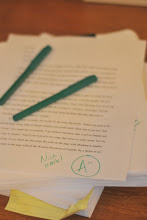I wrote a while back about
my daughter's frustrations with the story map homework she had been given from her second grade teacher. I wondered why she was so paralyzed and unable to complete the story map that simply asked for her to list the characters, setting, problem, solution, and mail plot events of a book off of her shelves at home. I did what I could to help her work through it. I tried to convince her that it was okay to have a different idea about a story than her teacher might have. And I was relieved that she got the assignment done.
But I got home last evening and there she sat at the dining room table with a blank story map sitting in front of her. She sat slumped over in frustration; my husband sat next to her at the table looking completely exasperated and frustrated.
Here we go again.
Seeing she was clearly stuck, I invited her to take the dog on a walk with me. As we walked up the hill on the trail behind our house, watching the dog frolic happily along side us, I took her through the same conversation we had last time she got so frustrated by the story map homework. I asked her if she remembered my story as a reader and what happened to my love of reading at school. She told it all back to me--about how I used to love to read when I was younger but grew to not enjoy it anymore by high school. She told me about how a teacher of mine told me I was flat out wrong when I disagreed with her interpretation of a book in AP English. I told her about how this shut me down as a reader for several years. I reminded her that I didn't want this to happen to her.
As we hiked along, I explained how I had thought last time about discussing this all with her teacher but decided against it. This will not be the first time that a teacher suggests there are right answers about a story in her life in school, and I do not want to rush in every year and try to fix it for my kid. Instead, I want to help my kid develop survival skills so she can still do the work asked of her with stories in school AND remain the engaged reader that she has become.
I do not blame my daughter's teacher. The problem is so much bigger--it's more in the unchecked assumptions we all carry with us about what we are supposed to do with stories in school.
So here's what we did. As we hiked, we composed a mantra for my daughter to remember when she did her homework. When we got home, the first thing she wanted to do was write it down--so we did. I wrote one word, she wrote the next and so on until we had written out the following:
"It is okay for me to have a different idea about a story than my teacher does as long as I can explain what I think and why I think it."
We both signed and dated it. And then we came up with a process for her to complete a story map "with very little stress." This we also wrote down, on the reverse of the page that held the mantra:
1) Read the story aloud together and pause whenever it seems a problem comes up in the story. Write the problems down and choose the one that seems to be the most important one.
2) Daughter writes in the characters, setting, main problem, and solution on the story map.
3) Daughter takes a break on the couch. During the break, she explains aloud what happens in the story and Mom or Dad writes down her words. This becomes daughter's rough draft.
4) Daughter uses this rough draft to select the plot events she wants to include in the story map and writes them on the story map.
5) We celebrate: "yay yay yay yippee yippee yippee!"
I wonder what this process will look like when she's in high school and writing literary analysis papers. I wonder how much help she'll still need at that point.
Signing off,
M. Shelley

